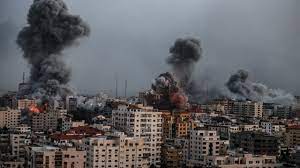In the afternoon across the Middle East, the situation unfolds with escalating tensions. The Iran-backed Houthi rebels, targeted in US and UK airstrikes, vow retaliation, emphasizing their commitment to escalate in response. The strikes, aimed at Houthis’ weapons facilities and air defense systems, are intended to restore stability in the Red Sea, where Houthis have targeted shipping.
The Houthi response comes as a member of their Political Council asserts that the aggression will not go unanswered, linking their military operations to the Israeli conflict in Gaza. Meanwhile, British Foreign Secretary David Cameron justifies the strikes, citing repeated warnings to the Houthis to cease their attacks, which pose risks to innocent lives and regional stability.
The US-led strikes in Yemen follow significant operations against pro-Iranian militia groups in Iraq and Syria. Iranian Foreign Minister Hossein Amir-Abdollahian expresses concern that recent US actions, including designating the Houthis as terrorists, complicate finding a political solution in the region.
Simultaneously, the Gaza conflict intensifies, with the Palestinian death toll rising due to Israeli attacks. Israel’s National Security Minister claims that US President Joe Biden is not fully backing Israel in its war against Hamas, leading to internal criticism. Demonstrations in Israel demand a change in government and the release of hostages in Gaza, reflecting public dissatisfaction with the handling of the crisis.
Amidst the chaos, the Israeli Defense Forces report targeting thousands of Hezbollah sites in southern Lebanon and Syria, aiming to disrupt the supply chain of ammunition and missiles from Iran to Syria and then to Lebanon since the beginning of the Gaza war on October 7.

